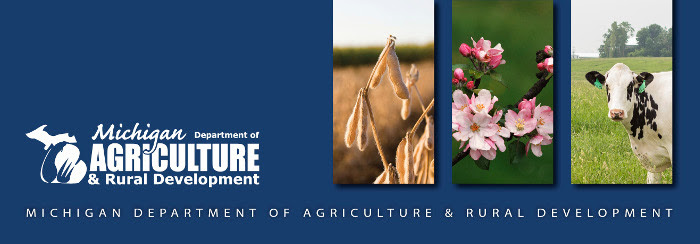 |
| For immediate release: June 11, 2025
Media contact: Lynsey Mukomel, 517-290-1734 MDARD Offers Summer Safety Tips to Help Owners Keep Their Animals Happy and HealthyMake this summer paws-itively excellent for your pets and livestock by following a few easy tips LANSING, Mich. — As Michiganders begin to enjoy the warmth of the summer season, the Michigan Department of Agriculture and Rural Development (MDARD) is sharing some of the best ways to keep animals healthy and safe. “With the warm weather, more opportunities arise for travel, gatherings and outdoor activities. As we make these plans, it is important not to overlook the needs of our animals,” said State Veterinarian Dr. Nora Wineland, DVM, MS, DACVPM. “From ensuring they have proper identification and are fully vaccinated to making sure they are cool and comfortable, there are many precautions owners can take to keep their animals safe throughout the summer.” Keep animals safe this summer by following these seven easy tips:
Be sure your animals have all the documentation, vaccinations, tests and treatments they need to reach their destination. Vaccinations are central to animals’ preventative care as the vaccines can protect them against common diseases, such as rabies, leptospirosis and distemper. Talk to your veterinarian to ensure your animals have everything they need to be ready to go! More information can also be found on MDARD’s Animal ID and Movement page and the U.S. Department of Agriculture’s Pet Travel website.
Just like people, animals can quickly get parched in hot temperatures. No matter the species, animals should have access to an abundant supply of cool, clean, fresh water to prevent dehydration.
While it may be tempting to toss your animals a few crispy nuggets from the grill, they cannot enjoy all the same foods and treats as we do. Salty, fatty, and/or highly seasoned foods (like chips, nuts and meat fat) can cause digestive upset. Also, chocolate, grapes/raisins, onions and xylitol (an artificial sweetener found in many candies and gum) can be poisonous to animals; and bones can cause injury and illness.
An animal’s age, breed, type of coat, and health history can all play a role in their ability to tolerate the heat. Keep an eye on them for signs of heat stress—like increased panting or drooling and being more lethargic. If they are showing these signs, it is time to immediately move them to a cooler area.
HABs form due to a rapid growth of cyanobacteria, also called blue-green algae, which are naturally found in lakes, rivers and ponds. To prevent illness in animals, keep them out of areas with scums or discolored water, rinse them off after contact with any lake water, and bring clean, fresh water for them to drink. If an animal becomes sick after contact with a suspected HAB, call your veterinarian right away. Also, animal illness due to HABs is reportable to MDARD. To report cases, submit a Reportable Disease Form or call 800-292-3939. To report any suspicious looking algae, email algaebloom@michigan.gov.
With all the fun outdoor activities, it can be easy for animals to sneak away and become lost. Make sure they have identification tags and/or microchips that are up to date with your current contact information, ensuring a better chance they can be returned home.
Any animal, domestic or wild, has the potential to carry disease. Even if an animal looks healthy, it could still be ill and pass unwanted germs to your animals. Protect your animals by keeping them away from any unfamiliar creatures. These tips can help keep your animals safe and healthy throughout the summer. If there are any concerns about your animals’ health now or throughout the year, please talk to your veterinarian. |

